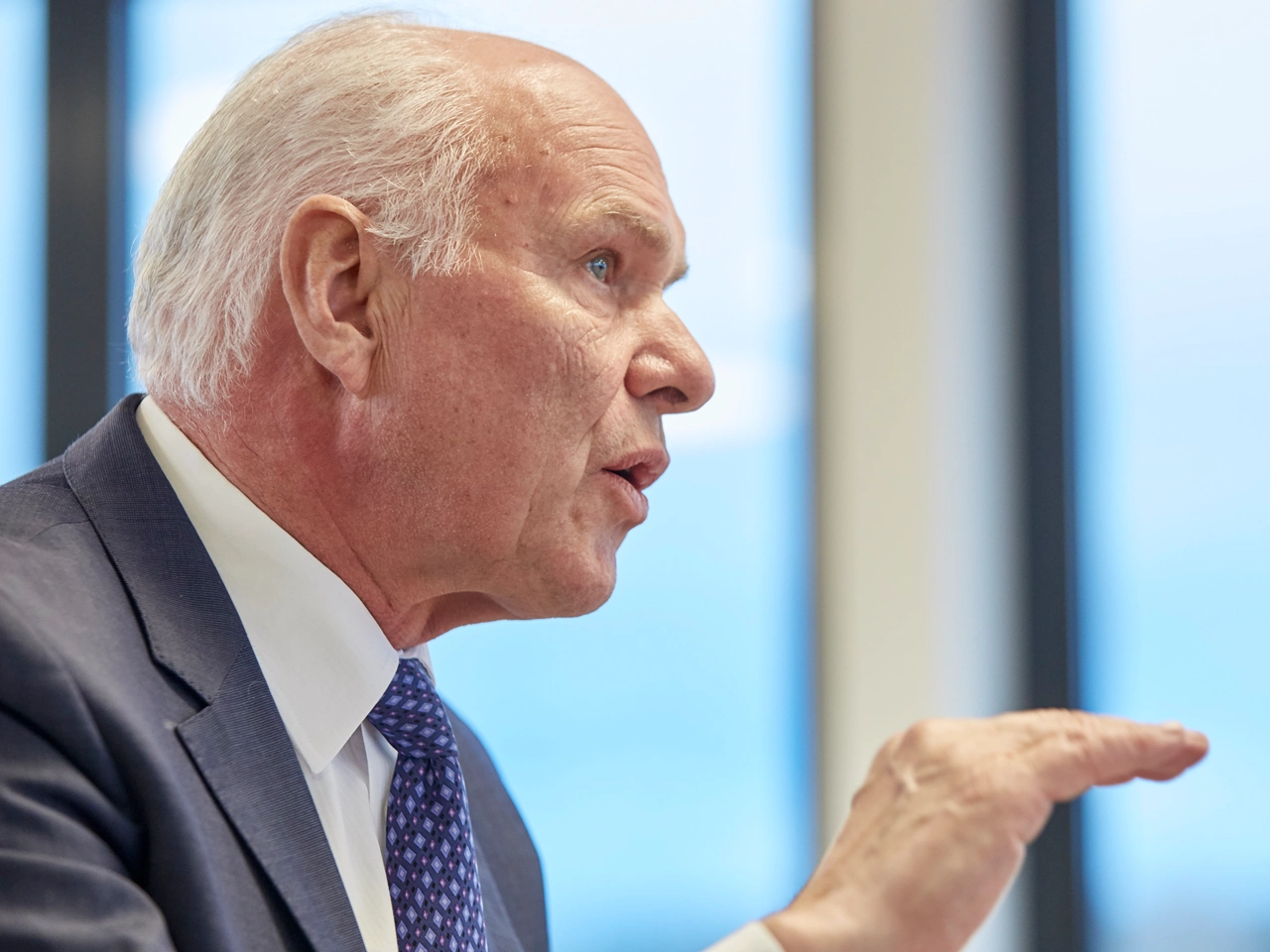Home > Company > Publications > Hans Hess
What does Industry 4.0 mean for Swiss industry? Taking the pulse of Switzerland as a location for business
Industry 4.0 is radically changing production processes. Is this an opportunity or a threat for Switzerland as a location for business? Swissmem President Hans Hess and Daniel Bachofen, Executive Board member at Bachofen AG, see a lot of potential despite challenging conditions.
Daniel Bachofen (DB): Mr Hess, how do you see the opportunities for Switzerland as a location for business?
Hans Hess (HH): Switzerland as a location for business is innovative, highly efficient and internationally oriented – and time and again it has faced challenges. This means that frequently we have had to work harder than others, and this has certainly made us stronger. The weakening of the Swiss franc has also given us a bit of momentum. I am totally confident that Switzerland has a great future ahead of it as a location for business.
DB: In November 2017 however there were further factory closures. I wonder whether the trend for relocating to low-wage countries has really come to an end.
HH: As a location for business, Switzerland is once again undergoing a structural change which will continue. But you have to realise that today we employ more people in the engineering industry than we did in 2000. Despite increasing efficiency and rationalisation, I am convinced that we will continue to create jobs. I very much hope that we have overcome the exchange rate problem.
Many companies are repositioning themselves in the international environment and taking advantage of the opportunity provided by the global upturn and by digitalisation.
DB: I’m actually surprised by the current hype around digitalisation. When I think about the arrival of the computer in the workplace, we’ve been engaged in this for over 40 years. Today it’s just on a much larger scale than it was back then.
HH: In Switzerland we are in an excellent position to take advantage of the opportunities offered by digitalisation. The level of automation is already very high, processes are lean, and companies have a modern IT infrastructure and well-trained staff. We now have to ensure that we advance far enough at a fast enough rate.
DB: The fact is that digitalisation will open up opportunities for Switzerland as a business location. One example is the production of small batches through to a batch size of 1 – an option which was previously unthinkable due to efficiency reasons.
HH: Exactly, this niche gives us a huge competitive advantage, especially over the competition in Asia. This will undoubtedly offer cost advantages and can produce large volumes in a short period of time. But when it comes to innovation, customer orientation, service quality and efficiency – especially for small batch sizes – we are unbeatable. These strengths are part of the DNA of Switzerland as a location for business. We need to nurture and develop these. Digital technologies
are helping us to do this.
DB: Digitalisation also has its downside. In terms of jobs, a study by the McKinsey Global Institute anticipates a potential rationalisation of 47 percent over the longer term. This confirms many people’s fears that the computer – in other words the Internet of Things – will replace people.
HH: The term «Internet of Things also contains the word things». We will also need physical things such as coffee machines, refrigerators, cars, heaters, computers and whatever else in the future. Someone has to develop and manufacture these; and that’s industry. I would counter the fears of job losses by saying that Swiss industry will offer more jobs thanks to digitalisation, but that these jobs will require different skills. Education and further training therefore have a significant role to play.
DB: In this context, your idea of a vocational apprenticeship for adults has issued a wake-up call which has caused a bit of a stir in politics and in the media.
HH: We believe that retraining for adults is a good and viable way to prepare our workforce for the digital world, to motivate them and to remove the worry of one day being replaced by robots. This is retraining based on the proven Swiss model of dual vocational education and training, which is the envy of other countries. A 54-year-old family man cannot simply take two years off to complete further training. With our initiative we are bringing professional practice and retraining under one roof. We are driving the project forward in collaboration with educational institutions and the State Secretariat for Education, Research, and Innovation. Even the trade unions are on board. We hope to be able to start pilot trials this year. It is a typically Swiss idea. Elsewhere it would probably be the state alone taking the initiative.
DB: Speaking of the state – how do you see its role in connection with digitalisation? Of course, certain regulations are needed, but there is a risk that progress will be unnecessarily restricted.
HH: The role of the state is to create good underlying conditions in order that businesses can make the most of the opportunities provided by digitalisation. This includes, in particular, the further development of infrastructure and promoting training. Politics has a tendency towards over-regulation. Instead, it should consider how it could support the meaningful development of digitalisation for the benefit of all. And show how this is done with the administration.
DB: This way of thinking also seems to be missing from the media reporting. They warn of dangers and neglect to also adequately address the opportunities.
HH: This is where we as business people have a responsibility. We have to take a stand. We have to clearly communicate to the public and politicians about the positive development opportunities digitalisation offers for Switzerland as a business location, and about what we are doing to prepare the majority of our employees for this journey and take them with us.
DB: What’s your message for companies in the Swiss industrial sector?
HH: It is extremely important to push ahead very quickly with digitalisation and to rely on the strengths that make Switzerland unique as a location for business: a consistent focus on the needs of the customer and the ability to develop innovative, high-quality solutions with well-trained people and to market these successfully. Switzerland is expensive as a location for business and only has a chance if we are more innovative, faster and more efficient than other countries.
The interview took place at Bachofen in Uster at the end of January 2018.
Hans Hess is a passionate entrepreneur and is deeply committed to Switzerland as a place to do business. For many years, he held leading positions in numerous Swiss industrial companies. Today, he serves as Chairman of the Board of Comet Holding AG and of Reichle & De-Massari Holding AG and is also a member of the Board of Burckhardt Compression Holding AG and dormakaba Holding AG.
Hans Hess graduated from the Swiss Federal Institute of Technology (ETH) in Zurich as a materials engineer and has an MBA from the University of Southern California in the USA. He understands the situation and the needs of Swiss industry better than almost anyone else and, at various levels, champions the interests of Switzerland as a location for business with vehemence, passion and personal commitment. He has been president of the industry association Swissmem since November 2010. He is also vice president of economiesuisse and runs his own consulting company, Hanesco AG, which offers international management services to industrial companies.
Swissmem: Switzerland – a location for business and creativity
Swissmem is the leading association for both SMEs and major corporations in the Swiss mechanical engineering, electrical equipment and metals industries (MEM industry) and related technology-focussed sectors. It represents the concerns of these industrial sectors to the public and to politicians and it campaigns for a constructive social partnership. Swissmem promotes the national and international competitiveness of its approximately 1100 member companies and supports them with needs-based services, networking, and training and continuing education for employees in line with the labour market requirements.

